Dante: The Divine Comedy
Inferno Cantos VIII-XIV
Authored and translated by A. S. Kline © Copyright 2000, All Rights Reserved.
This work may be freely reproduced, stored and transmitted, electronically or otherwise, for any non-commercial purpose. Conditions and Exceptions apply.
Contents
- Inferno Canto VIII:1-30 The Fifth Circle: Phlegyas: The Wrathful
- Inferno Canto VIII:31-63 They meet Filippo Argenti
- Inferno Canto VIII:64-81 They approach the city of Dis
- Inferno Canto VIII:82-130 The fallen Angels obstruct them
- Inferno Canto IX:1-33 Dante asks about precedents
- Inferno Canto IX:34-63 The Furies (Conscience) and Medusa (Obduracy)
- Inferno Canto IX:64-105 The Messenger from Heaven
- Inferno Canto IX:106-133 The Sixth Circle: Dis: The Heretics
- Inferno Canto X:1-21 Epicurus and his followers
- Inferno Canto X:22-51 Farinata degli Uberti
- Inferno Canto X:52-72 Cavalcante Cavalcanti
- Inferno Canto X:73-93 Farinata prophesies Dante’s long exile
- Inferno Canto X:94-136 The prophetic vision of the damned
- Inferno Canto XI:1-66 The structure of Hell: The Lower Circles
- Inferno Canto XI:67-93 The structure of Hell: The Upper Circles
- Inferno Canto XI:94-115 Virgil explains usury
- Inferno Canto XII:1-27 Above the Seventh Circle: The Minotaur
- Inferno Canto XII:28-48 The descent to the Seventh Circle
- Inferno Canto XII:49-99 The First Ring: The Centaurs: The Violent
- Inferno Canto XII:100-139 The Tyrants, Murderers and Warriors
- Inferno Canto XIII:1-30 The Second Ring: The Harpies: The Suicides
- Inferno Canto XIII:31-78 The Wood of Suicides: Pier delle Vigne
- Inferno Canto XIII:79-108 The fate of The Suicides
- Inferno Canto XIII:109-129 Lano Maconi and Jacomo da Sant’ Andrea
- Inferno Canto XIII:130-151 The unnamed Florentine
- Inferno Canto XIV:1-42 The Third Ring: The Violent against God
- Inferno Canto XIV:43-72 Capaneus
- Inferno Canto XIV:73-120 The Old Man of Crete
- Inferno Canto XIV:121-142 The Rivers Phlegethon and Lethe
Inferno Canto VIII:1-30 The Fifth Circle: Phlegyas: The Wrathful
I say, pursuing my theme, that, long before we reached the base of the high tower, our eyes looked upwards to its summit, because we saw two beacon-flames set there, and another, from so far away that the eye could scarcely see it, gave a signal in return. And I turned to the fount of all knowledge, and asked: ‘What does it say? And what does the other light reply? And who has made the signal?’ And he to me: ‘Already you can see, what is expected, coming over the foul waters, if the marsh vapours do not hide it from you.’
No bowstring ever shot an arrow that flew through the air so quickly, as the little boat, that I saw coming towards us, through the waves, under the control of a single steersman, who cried: ‘Are you here, now, fierce spirit?’ My Master said: ‘Phlegyas, Phlegyas, this time you cry in vain: you shall not keep us longer than it takes us to pass the marsh.’
Phlegyas in his growing anger, was like someone who listens to some great wrong done him, and then fills with resentment. My guide climbed down into the boat, and then made me board after him, and it only sank in the water when I was in. As soon as my guide and I were in the craft, its prow went forward, ploughing deeper through the water than it does carrying others.
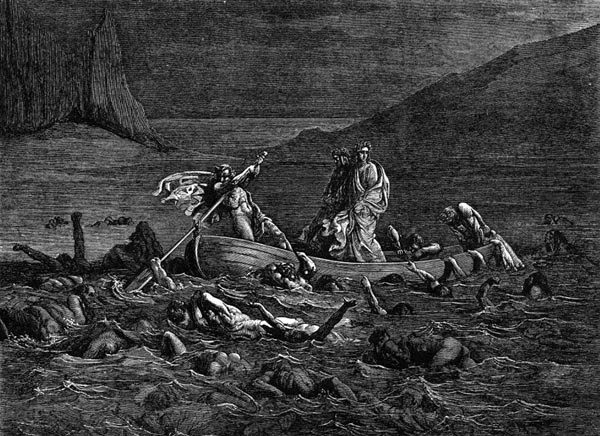
Inferno Canto VIII:31-63 They meet Filippo Argenti
While we were running through the dead channel, one rose up in front of me, covered with mud, and said: ‘Who are you, that come before your time?’ And I to him: ‘If I come, I do not stay here: but who are you, who are so mired?’ He answered: ‘You see that I am one who weeps.’ And I to him: ‘Cursed spirit, remain weeping and in sorrow! For I know you, muddy as you are.’
Then he stretched both hands out to the boat, at which the cautious Master pushed him off, saying: ‘Away, there, with the other dogs!’ Then he put his arms around my neck, kissed my face, and said: ‘Blessed be she who bore you, soul, who are rightly indignant. He was an arrogant spirit in your world: there is nothing good with which to adorn his memory: so, his furious shade is here. How many up there think themselves mighty kings, that will lie here like pigs in mire, leaving behind them dire condemnation!’
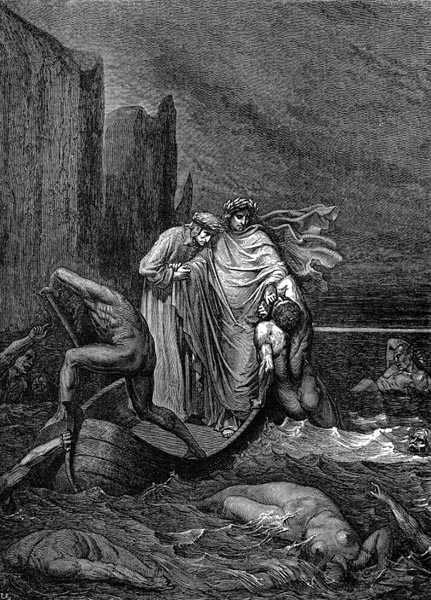
And I: ‘Master, I would be glad to see him doused in this swill before we quit the lake’. And he to me: ‘You will be satisfied, before the shore is visible to you: it is right that your wish should be gratified.’ Not long after this I saw the muddy people make such a rending of him, that I still give God thanks and praise for it. All shouted: ‘At Filippo Argenti!’ That fierce Florentine spirit turned his teeth in vengeance on himself.
Inferno Canto VIII:64-81 They approach the city of Dis
We left him there, so that I can say no more of him, but a sound of wailing assailed my ears, so that I turned my gaze in front, intently. The kind Master said: ‘Now, my son, we approach the city they call Dis, with its grave citizens, a vast crowd.’ And I: ‘Master, I can already see its towers, clearly there in the valley, glowing red, as if they issued from the fire.’ And he to me: ‘The eternal fire, that burns them from within, makes them appear reddened, as you see, in this deep Hell.’
We now arrived in the steep ditch, that forms the moat to the joyless city: the walls seemed to me as if they were made of iron. Not until we had made a wide circuit, did we reach a place where the ferryman said to us: ‘Disembark: here is the entrance.’
Inferno Canto VIII:82-130 The fallen Angels obstruct them
I saw more than a thousand of those angels, that fell from Heaven like rain, above the gates, who cried angrily: ‘Who is this, that, without death goes through the kingdom of the dead?’ And my wise Master made a sign to them, of wishing to speak in private. Then they furled their great disdain, and said: ‘Come on, alone, and let him go, who enters this kingdom with such audacity. Let him return, alone, on his foolish road: see if he can: and you, remain, who have escorted him, through so dark a land.’
Think, Reader, whether I was not disheartened at the sound of those accursed words, not believing I could ever return here. I said: ‘O my dear guide, who has ensured my safety more than the seven times, and snatched me from certain danger that faced me, do not leave me, so helpless: and if we are prevented from going on, let us quickly retrace our steps.’ And that lord, who had led me there, said to me: ‘Have no fear: since no one can deny us passage: it was given us by so great an authority. But you, wait for me, and comfort and nourish your spirit with fresh hope, for I will not abandon you in the lower world.’
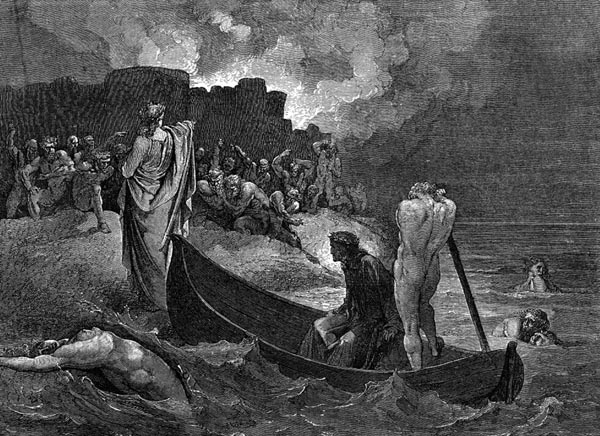
So the gentle father goes, and leaves me there, and I am left in doubt: since ‘yes’ and ‘no’ war inside my head. I could not hear what terms he offered them, but he had not been standing there long with them, when, each vying with the other, they rushed back. Our adversaries closed the gate in my lord’s face, leaving him outside, and he turned to me again with slow steps. His eyes were on the ground, and his expression devoid of all daring, and he said, sighing: ‘Who are these who deny me entrance to the house of pain?’ And to me he said: ‘Though I am angered, do not you be dismayed: I will win the trial, whatever obstacle those inside contrive. This insolence of theirs is nothing new, for they displayed it once before, at that less secret gate we passed, that has remained unbarred. Over it you saw the fatal writing, and already on this side of its entrance, one is coming, down the steep, passing the circles unescorted, one for whom the city shall open to us.’
Inferno Canto IX:1-33 Dante asks about precedents
The colour that cowardice had printed on my face, seeing my guide turn back, made him repress his own heightened colour more swiftly. He stopped, attentive, like one who listens, since his eyes could not penetrate far, through the black air and the thick fog. ‘Nevertheless we must win this struggle,’ he began, ‘if not … then help such as this was offered to us. Oh, how long it seems to me, that other’s coming!’ I saw clearly, how he hid the meaning of his opening words with their sequel, words differing from his initial thought. None the less his speech made me afraid, perhaps because I took his broken phrases to hold a worse meaning than they did.
‘Do any of those whose only punishment is deprivation of hope, ever descend, into the depths of this sad chasm, from the first circle?’ I asked this question, and he answered me: ‘It rarely happens, that any of us make the journey that I go on. It is true that I was down here, once before, conjured to do so by that fierce sorceress Erichtho, who recalled spirits to their corpses. My flesh had only been stripped from me a while when she forced me to enter inside that wall, to bring a spirit out of the circle of Judas. That is the deepest place, and the darkest, and the furthest from that Heaven that surrounds all things: I know the way well: so be reassured. This marsh, that breathes its foul stench, circles the woeful city round about, where we also cannot enter now without anger.’
Inferno Canto IX:34-63 The Furies (Conscience) and Medusa (Obduracy)
And he said more that I do not remember, because my eyes had been drawn to the high tower, with the glowing crest, where, in an instant, three hellish Furies, stained with blood, had risen, that had the limbs and aspects of women, covered with a tangle of green hydras, their hideous foreheads bound with little adders, and horned vipers. And Virgil, who knew the handmaids of the queen of eternal sadness well, said to me: ‘See, the fierce Erinyes.’
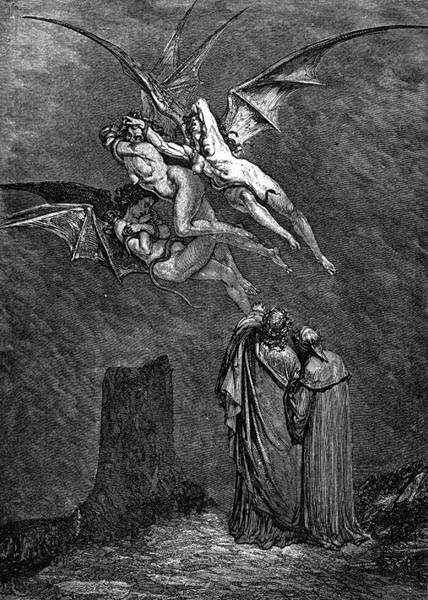
That is Megaera on the left: the one that weeps, on the right, is Alecto: Tisiphone is in the middle.’: then he was silent. Each one was tearing at her breast with her claws, beating with her hands, and crying out so loudly, that I pressed close to the poet, out of fear. ‘Let Medusa come,’ they all said, looking down on us, ‘so that we can turn him to stone: we did not fully revenge Theseus’s attack.’
‘Turn your back.’ said the Master, and he himself turned me round. ‘Keep your eyes closed, since there will be no return upwards, if she were to show herself, and you were to see her.’ Not leaving it to me, he covered them, also, with his own hands.
O you, who have clear minds, take note of the meaning that conceals itself under the veil of clouded verse!
Inferno Canto IX:64-105 The Messenger from Heaven
Now, over the turbid waves, there came a fearful crash of sound, at which both shores trembled; a sound like a strong wind, born of conflicting heat, that strikes the forest, remorselessly, breaks the branches, and beats them down, and carries them away, advances proudly in a cloud of dust, and makes wild creatures, and shepherds, run for safety. Virgil uncovered my eyes, and said: ‘Now direct your vision to that ancient marsh, there, where the mists are thickest.’ Like frogs, that all scatter through the water, in front of their enemy the snake, until each one squats on the bottom, so I saw more than a thousand damaged spirits scatter, in front of one who passed the Stygian ferry with dry feet. He waved that putrid air from his face, often waving his left hand before it, and only that annoyance seemed to weary him. I well knew he was a messenger from Heaven, and I turned to the Master, who made a gesture that I should stay quiet, and bow to him.
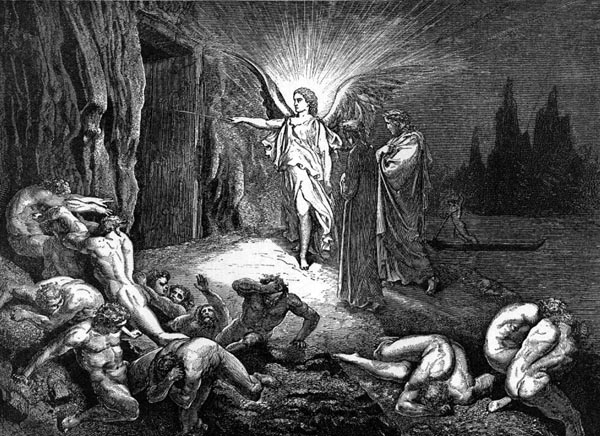
How full of indignation he seemed to me! He reached the gate, and opened it with a wand: there was no resistance. On the vile threshold he began to speak: ‘O, outcasts from Heaven, why does this insolence still live in you? Why are you recalcitrant to that will, whose aims can never be frustrated, and that has often increased your torment? What use is it to butt your heads against the Fates? If you remember, your Cerberus still shows a throat and chin scarred from doing so.’
Then he returned, over the miry pool, and spoke no word to us, but looked like one preoccupied and driven by other cares, than of those who stand before him. And we stirred our feet towards the city, in safety, after his sacred speech.
Inferno Canto IX:106-133 The Sixth Circle: Dis: The Heretics
We entered Dis without a conflict, and I gazed around, as soon as I was inside, eager to know what punishment the place enclosed, and saw on all sides a vast plain full of pain and vile torment.
As at Arles, where the Rhone stagnates, or Pola, near the Gulf of Quarnaro, that confines Italy, and bathes its coast, the sepulchres make the ground uneven, so they did here, all around, only here the nature of it was more terrible.
Flames were scattered amongst the tombs, by which they were made so red-hot all over, that no smith’s art needs hotter metal. Their lids were all lifted, and such fierce groans came from them, that, indeed, they seemed to be those of the sad and wounded.
And I said: ‘Master, who are these people, entombed in those vaults, who make themselves known by tormented sighing?’ And he to me: ‘Here are the arch-heretics, with their followers, of every sect: and the tombs contain many more than you might think. Here like is buried with like, and the monuments differ in degrees of heat.’ Then after turning to the right, we passed between the tormented, and the steep ramparts.
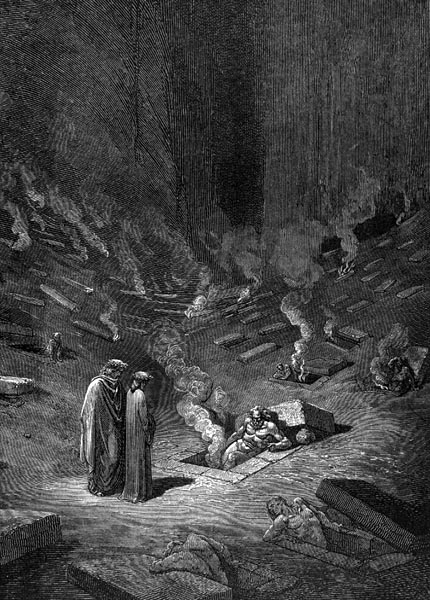
Inferno Canto X:1-21 Epicurus and his followers
Now my Master goes, and I, behind him, by a secret path between the city walls and the torments. I began: ‘O, summit of virtue, who leads me round through the circles of sin, as you please, speak to me, and satisfy my longing. Can those people, who lie in the sepulchres, be seen? The lids are all raised, and no one keeps guard.’ And he to me: ‘They will all be shut, when they return here, from Jehoshaphat, with the bodies they left above. In this place Epicurus and all his followers are entombed, who say the soul dies with the body. Therefore, you will soon be satisfied, with an answer to the question that you ask me, and also the longing that you hide from me, here, inside.’ And I: ‘Kind guide, I do not keep my heart hidden from you, except by speaking too briefly, something to which you have previously inclined me.’
Inferno Canto X:22-51 Farinata degli Uberti
‘O Tuscan, who goes alive through the city of fire, speaking so politely, may it please you to rest in this place. Your speech shows clearly you are a native of that noble city that I perhaps troubled too much.’ This sound came suddenly from one of the vaults, at which, in fear, I drew a little closer to my guide. And he said to me: ‘Turn round: what are you doing: look at Farinata, who has raised himself: you can see him all from the waist up.’
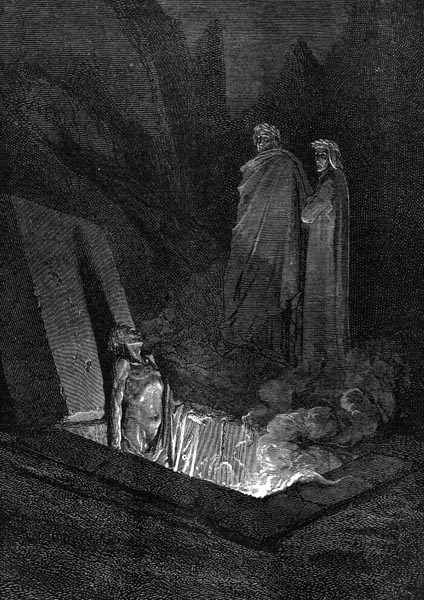
I had already fixed my gaze on him, and he rose erect in stance and aspect, as if he held the Inferno in great disdain. The spirited and eager hands of my guide pushed me through the sepulchres towards him, saying: ‘Make sure your words are measured.’ When I was at the base of the tomb, Farinata looked at me for a while, and then almost contemptuously, he demanded of me: ‘Who were your ancestors?’
I, desiring to obey, concealed nothing, but revealed the whole to him, at which he raised his brows a little. Then he said: ‘They were fiercely opposed to me, and my ancestors and my party, so that I scattered them twice.’ I replied: ‘Though they were driven out, they returned from wherever they were, the first and the second time, but your party have not yet learnt that skill.’
Inferno Canto X:52-72 Cavalcante Cavalcanti
Then, a shadow rose behind him, from the unclosed space, visible down to the tip of its chin: I think it had raised itself on to its knees. It gazed around me, as if it wished to see whether anyone was with me, but when all its hopes were quenched, it said, weeping: ‘If by power of intellect, you go through this blind prison, where is my son, and why is he not with you?’ And I to him: ‘I do not come through my own initiative: he that waits there, whom your Guido disdained perhaps, leads me through this place’
His words and the nature of his punishment had spelt his name to me, so that my answer was a full one. Suddenly raising himself erect, he cried: ‘What did you say? Disdained? Is he not still alive? Does the sweet light not strike his eyes?’ When he saw that I delayed in answering, he dropped supine again, and showed himself no more.
Inferno Canto X:73-93 Farinata prophesies Dante’s long exile
But the other one, at whose wish I had first stopped, generously did not alter his aspect or move his neck, or turn his side. Continuing his previous words, he said: ‘And if my party have learnt that art of return badly, it tortures me more than this bed, but the face of the moon-goddess Persephone, who rules here, will not be crescent fifty times, before you learn the difficulty of that art. And, as you wish to return to the sweet world, tell me why that people is so fierce towards my kin, in all its lawmaking?’ At which I answered him: ‘The great slaughter and havoc, that dyed the Arbia red, is the cause of those indictments against them, in our churches.’
Then he shook his head, sighing, and said: ‘I was not alone in that matter, nor would I have joined with the others without good cause, but I was alone, there, when all agreed to raze Florence to the ground, and I openly defended her.
Inferno Canto X:94-136 The prophetic vision of the damned
‘Ah, as I hope your descendants might sometime have peace,’ I begged him, ‘solve the puzzle that has entangled my mind. It seems, if I hear right, that you see beforehand what time brings, but have a different knowledge of the present.’ ‘Like one who has imperfect vision,’ he said, ‘we see things that are distant from us: so much of the light the supreme Lord still allows us. But when they approach, or come to be, our intelligence is wholly void, and we know nothing of your human state, except what others tell us. So you may understand that all our knowledge of the future will end, from the moment when the Day of Judgement closes the gate of futurity.’
Then, as if conscious of guilt, I said: ‘Will you therefore, tell that fallen one, now, that his son is still joined to the living. And if I was silent before in reply, let him know it was because my thoughts were already entangled in that error you have resolved for me.’
And now my Master was recalling me, at which I begged the spirit, with more haste, to tell me who was with him. He said to me: ‘I lie here with more than a thousand: here inside is Frederick the Second, and the Cardinal, Ubaldini, and of the rest I am silent.’ At that he hid himself, and I turned my steps towards the poet of antiquity, reflecting on the words that boded trouble for me.
Virgil moved on, and then, as we were leaving, said to me: ‘Why are you so bewildered?’ And I satisfied his question. The sage exhorted me: ‘Let your mind retain what you have heard of your fate, and note this,’ and he raised his finger, ‘When you stand before the sweet rays of that lady, whose bright eyes see everything, you will learn the journey of your life through her.’
Then he turned his feet towards the left: we abandoned the wall, and went towards the middle, by a path that makes its way into a valley, that, even up there, forced us to breathe its foulness.
Inferno Canto XI:1-66 The structure of Hell: The Lower Circles
On the edge of a high bank, made of great broken rocks in a circle, we came above a still more cruel crowd, and here, because of the repulsive, excessive stench that the deep abyss throws out, we approached it in the shelter of a grand monument, on which I saw an inscription that said: ‘I hold Anastasius, that Photinus drew away from the true path.’
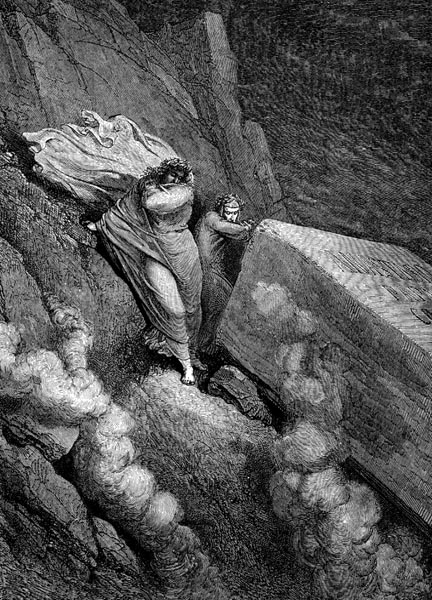
The Master said: ‘We must delay our descent until our sense is somewhat used to the foul wind, and then we will not notice it.’ I said to him: ‘Find us something to compensate, so that the time is not wasted.’ And he: ‘See, I have thought of it.’ He began: ‘My son, within these walls of stone, are three graduated circles like those you are leaving. They are all filled with accursed spirits: but so that the sight of them may be enough to inform you, in future, listen how and why they are constrained.
The outcome of all maliciousness, that Heaven hates, is harm: and every such outcome, hurts others, either by force or deceit. But because deceit is a vice peculiar to human beings, it displeases God more, and therefore the fraudulent are placed below, and more pain grieves them. The whole of the seventh circle is for the violent, but, since violence can be done to three persons, it is constructed and divided in three rings. I say violence may be done to God, or to oneself, or one’s neighbour, and their person or possessions, as you will hear, in clear discourse.
Death or painful wounds may be inflicted on one’s neighbour; and devastation, fire, and pillage, on his substance. Therefore the first ring torments all homicides; every one who lashes out maliciously; and thieves and robbers; in their diverse groups.
A man may do violence to himself and to his property, and so, in the second ring, all must repent, in vain, who deprive themselves of your world; or gamble away and dissipate their wealth; or weep there, when they should be happy.
Violence may be done, against the Deity, denying him and blaspheming in the heart, and scorning Nature and her gifts, and so the smallest ring stamps with its seal both Sodom and Cahors, and those who speak scornfully of God, in their hearts.
Human beings may practise deceit, which gnaws at every conscience, on one who trusts them, or on one who places no trust. This latter form of fraud only severs the bond of love that Nature created, and so, in the eighth circle, are nested hypocrisy; sorcery; flattery; cheating; theft and selling of holy orders; pimps; corrupters of public office; and similar filth.
In the previous form, that love that Nature creates is forgotten, and also that which is added later, giving rise to special trust. So, in the ninth, the smallest circle, at the base of the universe, where Dis has his throne, every traitor is consumed eternally.’
Inferno Canto XI:67-93 The structure of Hell: The Upper Circles
And I said: ‘Master, your reasoning proceeds most clearly, and lays out excellently this gulf, and those that populate it, but tell me why those of the great marsh, those whom the wind drives, and the rain beats, and those who come together with sharp words, are not punished in the burning city, if God’s anger is directed towards them? And if not why they are in such a state?’ And he to me: ‘Why does your mind err so much more than usual, or are your thoughts somewhere else?
Do you not remember the words with which your Aristotelian Ethics speaks of the three natures that Heaven does not will: incontinence, malice and mad brutishness, and how incontinence offends God less and incurs less blame? If you consider this doctrine correctly, and recall to mind who those are, that suffer punishment out there, above, you will see, easily, why they are separated from these destructive spirits, and why divine justice strikes them with less anger.’
I said: ‘O Sun, that heals all troubled sight, you make me so content when you explain to me, that to question is as delightful as to know.’
Inferno Canto XI:94-115 Virgil explains usury
‘Go back a moment, to where you said that usury offends divine goodness, and unravel that knot.’ He said to me: ‘To him who attends, Philosophy shows, in more than one place, how Nature takes her path from the Divine Intelligence, and its arts, and if you note your Physics well, you will find, not many pages in, that art, follows her, as well as it can, as the pupil does the master, so that your art is as it were the grandchild of God. By these two, art and nature, man must earn his bread and flourish, if you recall to mind Genesis, near its beginning.
Because the usurer holds to another course, he denies Nature, in herself, and in that which follows her ways, putting his hopes elsewhere.
But follow me, now, by the path I choose, for Pisces quivers on the horizon, and all Bootës covers Caurus, the north-west wind, and over there, some way, we descend the cliff.’
Inferno Canto XII:1-27 Above the Seventh Circle: The Minotaur
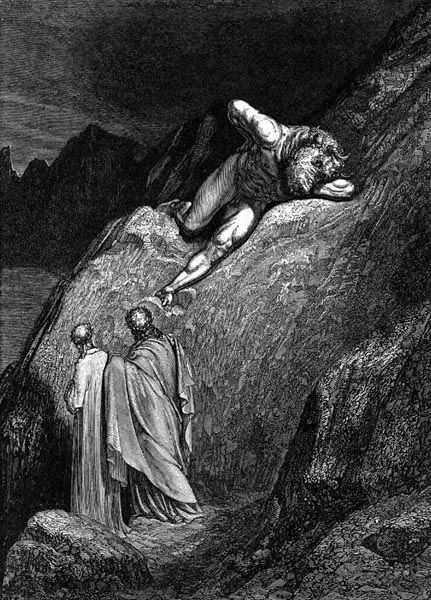
The place we reached to climb down the bank was craggy, and, because of the creature there, also, a path that every eye would shun. The descent of that rocky precipice was like the landslide that struck the left bank of the Adige, this side of Trento, caused by an earthquake or a faulty buttress, since the rock is so shattered, from the summit of the mountain, where it started, to the plain, that it might form a route, for someone above: and at the top of the broken gully, the infamy of Crete, the Minotaur, conceived on Pasiphaë, in the wooden cow, lay stretched out.
When he saw us he gnawed himself, like someone consumed by anger inside. My wise guide called to him: ‘Perhaps you think that Theseus, the Duke of Athens, is here, who brought about your death, in the world above? Leave here, monstrous creature. This man does not come here, aided by your sister, Ariadne, but passes through to see the punishments.’
Like a bull, breaking loose, at the moment when it receives the fatal blow, that cannot go forward, but plunges here and there, so I saw the Minotaur, and my cautious guide cried: ‘Run to the passage: while he is in a fury, it is time for you to descend.’
Inferno Canto XII:28-48 The descent to the Seventh Circle
So we made our way, downwards, over the landslide of stones, that often shifted beneath my feet, from the unaccustomed weight. I went thoughtfully, and he said: ‘Perhaps you are contemplating this fallen mass of rock, guarded by the bestial anger that I quelled a moment ago. I would have you know that the previous time I came down here to the deep Inferno, this spill had not yet fallen. But, if I discern the truth, the deep and loathsome valley, shook, not long before He came to take the great ones of the highest circle, so that I thought the universe thrilled with love, by which as some believe, the world has often been overwhelmed by chaos. In that moment ancient rocks, here and elsewhere, tumbled.
But fix your gaze on the valley, because we near the river of blood, in which those who injure others by violence are boiled.’
Inferno Canto XII:49-99 The First Ring: The Centaurs: The Violent
O blind desires, evil and foolish, which so goad us in our brief life, and then, in the eternal one, ruin us so bitterly! I saw a wide canal bent in an arc, looking as if it surrounded the whole plain, from what my guide had told me. Centaurs were racing, one behind another, between it and the foot of the bank, armed with weapons, as they were accustomed to hunt on earth.
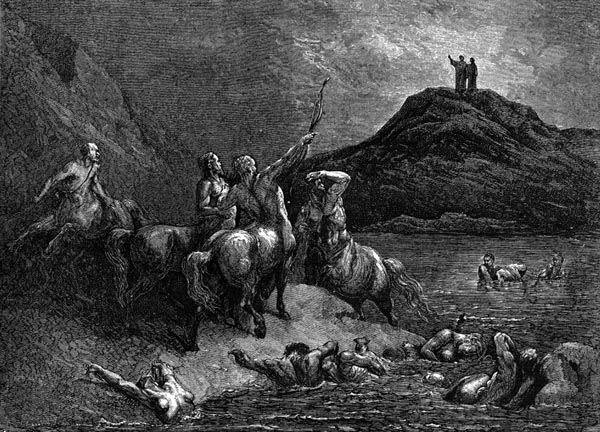
Seeing us descend they all stood still, and three, elected leaders, came from the group, armed with bows and spears. And one of them shouted from the distance: ‘What torment do you come for, you that descend the rampart? Speak from there, if not, I draw the bow.’ My Master said: ‘We will make our reply to Chiron, who is there, nearby. Sadly, your nature was always rash.’ Then he touched me, and said: ‘That is Nessus, who died because of his theft of the lovely Deianira, and, for his blood, took vengeance, through his blood.
He, in the centre, whose head is bowed to his chest, is the great Chiron, who nursed Achilles: the other is Pholus, who was so full of rage. They race around the ditch, in thousands, piercing with arrows any spirit that climbs further from the blood than its guilt has condemned it to. We drew near the swift creatures. Chiron took an arrow, and pushed back his beard from his face with the notched flight. When he had uncovered his huge mouth, he said to his companions: ‘Have you noticed that the one behind moves whatever he touches? The feet of dead men do not usually do so.’
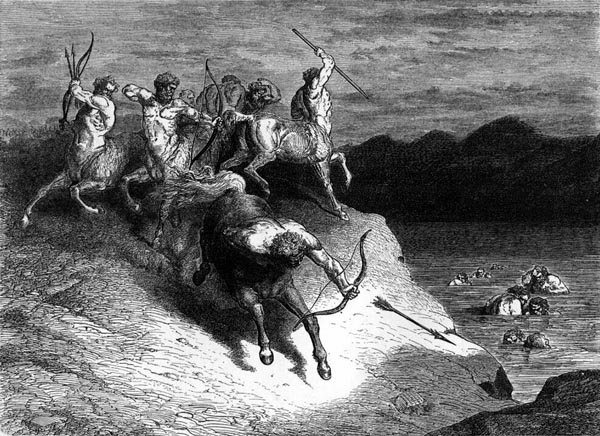
And my good guide, who was by Chiron’s front part, where the two natures join, replied: ‘He is truly alive, and, alone, I have to show him the dark valley. Necessity brings him here, and not desire. She, who gave me this new duty, came from singing Alleluiahs: he is no thief: nor am I a wicked spirit. But, by that virtue, by means of which I set my feet on so unsafe a path, lend us one of your people whom we can follow, so that he may show us where the ford is, and carry this one over on his back, since he cannot fly as a spirit through the air.’
Chiron twisted to his right, and said to Nessus: ‘Turn, and guide them, then, and if another crew meet you, keep them off.’
Inferno Canto XII:100-139 The Tyrants, Murderers and Warriors
We moved onwards with our trustworthy guide, along the margin of the crimson boiling, in which the boiled were shrieking loudly. I saw people immersed as far as the eyebrows, and the great Centaur said: ‘These are tyrants who indulged in blood, and rapine. Here they lament their offences, done without mercy. Here is Alexander, and fierce Dionysius of Syracuse, who gave Sicily years of pain. That head of black hair is Azzolino, and the other, which is blonde, is Obizzo da Este, whose life was quenched, in truth, by his stepson, up in the world.’ Then I turned to the poet, and he said: ‘Let him guide you first, now, and I second.’
A little further on, Nessus paused, next to people who seemed to be sunk in the boiling stream up to their throat. He showed us a shade, apart by itself, saying: ‘That one, Guy de Montfort, in God’s church, pierced that heart that is still venerated by the Thames.’
Then I saw others, who held their heads and all their chests, likewise, free of the river: and I knew many of these. So the blood grew shallower and shallower, until it only cooked their feet, and here was our ford through the ditch.
The Centaur said: ‘As you see the boiling stream continually diminishing, on this side, so, on the other, it sinks more and more, till it comes again to where tyrants are doomed to grieve. Divine Justice here torments Attila, the scourge of the earth; and Pyrrhus, and Sextus Pompeius; and for eternity milks tears, produced by the boiling, from Rinier da Corneto, and Rinier Pazzo, who made war on the highways.’ Then he turned back, and recrossed the ford.
Inferno Canto XIII:1-30 The Second Ring: The Harpies: The Suicides
Nessus had not yet returned to the other side, when we entered a wood, unmarked by any path. The foliage was not green, but a dusky colour: the branches were not smooth, but warped and knotted: there were no fruits there, but poisonous thorns. The wild beasts, that hate the cultivated fields, in the Tuscan Maremma, between Cecina and Corneto, have lairs less thick and tangled. Here the brutish Harpies make their nests, they who chased the Trojans from the Strophades, with dismal pronouncements of future tribulations.
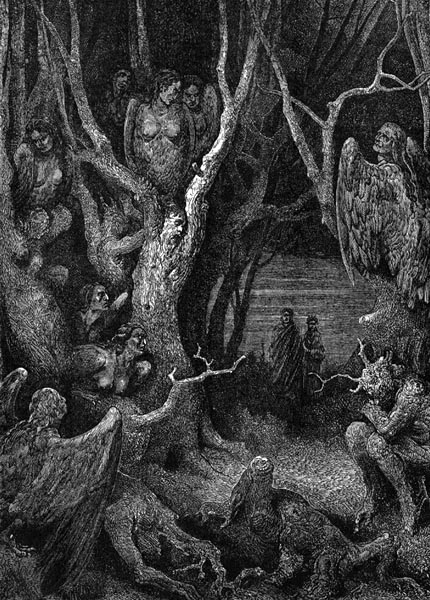
They have broad wings, and human necks and faces, clawed feet, and large feathered bellies, and they make mournful cries in that strange wood. The kind Master said: ‘Before you go further, be aware you are in the second ring, and will be until you come to the dreadful sands. So look carefully, and you will see things that might make you mistrust my words.’
Already I heard sighs on every side, and saw no one to make them, at which, I stood totally bewildered. I think that he thought that I was thinking that many of those voices came from among the trees, from people who hid themselves because of us. So the Master said: ‘If you break a little twig from one of these branches, the thoughts you have will be seen to be in error.’
Inferno Canto XIII:31-78 The Wood of Suicides: Pier delle Vigne
Then I stretched my hand out a little, and broke a small branch from a large thorn, and its trunk cried out: ‘Why do you tear at me?’ And when it had grown dark with blood, it began to cry out again: ‘Why do you splinter me? Have you no breath of pity? We were men, and we are changed to trees: truly, your hand would be more merciful, if we were merely the souls of snakes.’
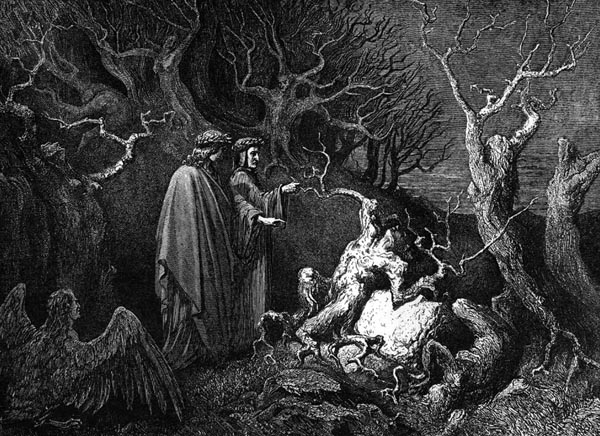
Just as a green branch, burning at one end, spits and hisses with escaping air at the other, so from that broken wood, blood and words came out together: at which I let the branch fall, and stood, like a man afraid. My wise sage replied: ‘Wounded spirit, if he had only believed, before, what he had read in my verse, he would not have lifted his hand to you, but the incredible nature of the thing made me urge him to do what grieves me. But tell him who you were, so that he might make you some amends, and renew your fame up in the world, to which he is allowed to return.
And the tree replied: ‘You tempt me so, with your sweet words, that I cannot keep silent, but do not object if I am expansive in speech. I am Pier delle Vigne, who held both the keys to Frederick’s heart, and employed them, locking and unlocking, so quietly, that I kept almost everyone else from his secrets. I was so faithful to that glorious office that through it I lost my sleep and my life.
The whore that never turned her eyes from Caesar’s household, Envy, the common disease and vice of courts, stirred all minds against me, and being stirred they stirred Augustus, so that my fine honours were changed to grievous sorrows. My spirit, in a scornful mode, thinking to escape scorn by death, made me, though I was just, unjust to myself. By the strange roots of this tree, I swear to you, I never broke faith with my lord, so worthy of honour. If either of you return to the world, raise and cherish the memory of me, that still lies low from the blow Envy gave me.’
Inferno Canto XIII:79-108 The fate of The Suicides
The poet listened for a while, then said to me: ‘Since he is silent, do not lose the moment, but speak, and ask him to tell you more.’ At which I said to him: ‘You ask him further, about what you think will interest me, because I could not, such pity fills my heart.’ So he continued: ‘That the man may do freely what your words request from him, imprisoned spirit, be pleased to tell us further how the spirits are caught in these knots: and tell us, if you can, whether any of them free themselves from these limbs.’
Then the trunk blew fiercely, and the breath was turned to words like these: ‘My reply will be brief. When the savage spirit leaves the body, from which it has ripped itself, Minos sends it to the seventh gulf. It falls into this wood, and no place is set for it, but, wherever chance hurls it, there it sprouts, like a grain of German wheat, shoots up as a sapling, and then as a wild tree. The Harpies feeding then on its leaves hurt it, and give an outlet to its hurt.
Like others we shall go to our corpses on the Day of Judgement, but not so that any of us may inhabit them again, because it would not be just to have what we took from ourselves. We shall drag them here, and our bodies will be hung through the dismal wood, each on the thorn-tree of its tormented shade.
Inferno Canto XIII:109-129 Lano Maconi and Jacomo da Sant’ Andrea
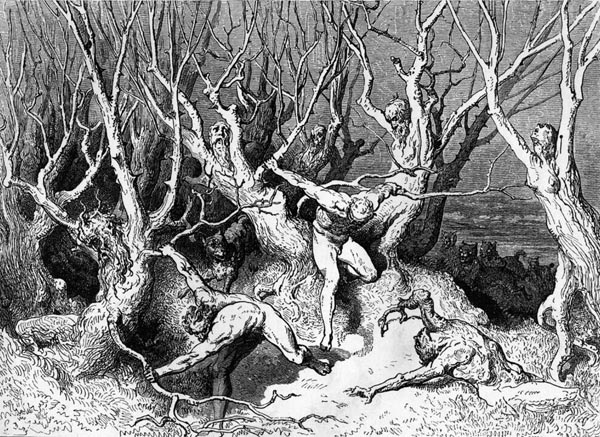
We were still listening to the tree, thinking it might tell us more, when we were startled by a noise, like those who think the wild boar is nearing where they stand, and hear the animals and the crashing of branches. Behold, on the left, two naked, torn spirits, running so hard they broke every thicket of the wood. The leader, cried: ‘Come Death, come now!’ and the other, Jacomo, who felt himself to be too slow cried: ‘Lano, your legs were not so swift at the jousts of Toppo.’ And since perhaps his breath was failing him, he merged himself with a bush.
The wood behind them was filled with black bitch hounds, eager and quick as greyhounds that have slipped the leash. They clamped their teeth into Lano, who squatted, and tore him bit by bit, then carried off his miserable limbs.
Inferno Canto XIII:130-151 The unnamed Florentine
My guide now took me by the hand, and led me to the bush, which was grieving, in vain, through its bleeding splinters, crying: ‘O Jacomo da Sant’ Andrea, what have you gained by making me your screen? What blame do I have for your sinful life? When the Master had stopped next to it, he said: ‘Who were you, that breathe out your mournful speech, with blood, through so many wounds?
And he to us: ‘You spirits, who have come to view the dishonourable mangling that has torn my leaves from me, gather them round the foot of this sad tree. I was of Florence, that city, which changed Mars, its patron, for St John the Baptist, because of which that god, through his powers, will always make it sorrowful. Were it not that some fragments of his statue remain where Ponte Vecchio crosses the Arno, those citizens, who rebuilt it on the ashes Attila left, would have worked in vain. I made a gibbet for myself, from my own roofbeam.’
Inferno Canto XIV:1-42 The Third Ring: The Violent against God
As the love of my native place stirred in me, I gathered up the scattered leaves, and gave them back to him who was already hoarse. Then we came to the edge, where the second round is divided from the third, where a fearsome form of justice is seen. To make these new things clear, I say we reached a plain, where the land repels all vegetation. The mournful wood makes a circle round it, as the ditch surrounds the wood: here we stepped close to its very rim.
The ground was dry, thick sand, no different in form than that which Cato once trod. O God’s vengeance, how what was shown to my sight should be feared, by all who read! I saw many groups of naked spirits, who were all moaning bitterly: and there seemed to be diverse rules applied to them. Some were lying face upward on the ground; some sat all crouched: and others roamed around continuously.
Those who moved were more numerous, and those that lay in torment fewer, but uttering louder cries of pain. Dilated flakes of fire, falling slowly, like snow in the windless mountains, rained down over all the vast sands. Like the flames that Alexander saw falling, in the hot zones of India, over all his army, until they reached the ground, fires that were more easily quenched while they were separate, so that his troops took care to trample the earth - like those, fell this eternal heat, kindling the sand like tinder beneath flint and steel, doubling the pain.
The dance of their tortured hands was never still, now here, now there, shaking off the fresh burning.
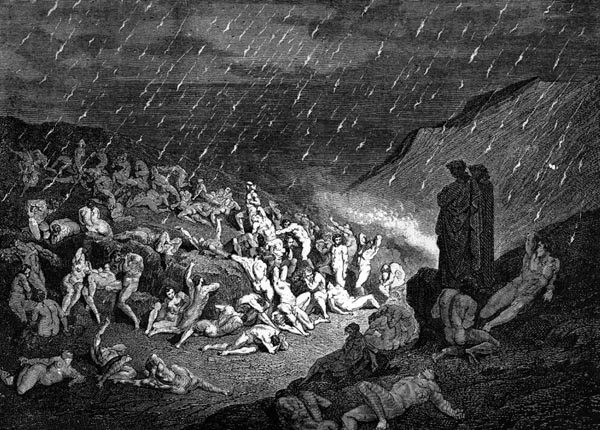
Inferno Canto XIV:43-72 Capaneus
I began: ‘Master, you who overcome everything except the obdurate demons, that came out against us at the entrance to the gate, who is that great spirit, who seems indifferent to the fire, and lies there, scornful, contorted, so that the rain does not seem to deepen his repentance?’ And he himself, noting that I asked my guide about him, cried: ‘What I was when I was living, I am now I am dead. Though Jupiter exhausts Vulcan, his blacksmith, from whom he took, in anger, the fierce lightning bolt, that I was struck down with on my last day, and though he exhausts the others, the Cyclopes, one by one, at the black forge of Aetna, shouting: ‘Help, help, good Vulcan’, just as he did at the battle of Phlegra, between the gods and giants, and hurls his bolts at me with all his strength, he shall still not enjoy a true revenge.’
Then my guide spoke, with a force I had not heard before: ‘O Capaneus, you are punished more in that your pride is not quenched: no torment would produce pain fitting for your fury, except your own raving.’ Then he turned to me with gentler voice, saying: ‘That was one of the seven kings who laid siege to Thebes: and he held God, and seems to hold him, in disdain, and value him lightly, but as I told him, his spite is an ornament that fits his breast.’
Inferno Canto XIV:73-120 The Old Man of Crete
‘Now follow me, and be careful not to place your feet yet on the burning sand, but always keep back close to the wood.’ We came, in silence, to the place, where a little stream gushes from the wood, the redness of which still makes me shudder. Like the rivulet that runs sulphur-red from the Bulicame spring, near Viterbo, that the sinful women share among themselves, so this ran down over the sand. Its bed and both its sloping banks were petrified, and its nearby margins: so that I realised our way lay there.
‘Among all the other things that I have shown you, since we entered through the gate, whose threshold is denied to no one, your eyes have seen nothing as noteworthy as this present stream, that quenches all the flames over it.’ These were my guide’s words, at which I begged him to grant me food, for which he had given me the appetite.
He then said: ‘There is a deserted island in the middle of the sea, named Crete, under whose king Saturn, the world was pure. There is a mountain, there, called Ida, which was once gladdened with waters and vegetation, and now is abandoned like an ancient spoil heap. Rhea chose it, once, as the trusted cradle of her son, and the better to hide him when he wept, caused loud shouts to echo from it.
Inside the mountain, a great Old Man, stands erect, with his shoulders turned towards Egyptian Damietta, and looks at Rome as if it were his mirror. His head is formed of pure gold, his arms and his breasts are refined silver: then he is bronze as far as the thighs. Downwards from there he is all of choice iron, except that the right foot is baked clay, and more of his weight is on that one than the other. Every part, except the gold, is cleft with a fissure that sheds tears, which collect and pierce the grotto. Their course falls from rock to rock into this valley. They form Acheron, Styx and Phlegethon, then, by this narrow channel, go down to where there is no further fall, and form Cocytus: you will see what kind of lake that is: so I will not describe it to you here.’
Inferno Canto XIV:121-142 The Rivers Phlegethon and Lethe
I said to him: ‘If the present stream flows down like that from our world, why does it only appear to us on this bank? And he to me: ‘You know the place is circular, and though you have come far, always to the left, descending to the depths, you have not yet turned through a complete round, so that if anything new appears to us, it should not bring an expression of wonder to your face.’
And I again: ‘Master, where are Lethe, and Phlegethon found, since you do not speak of the former, and say that the latter is formed from these tears?’ He replied: ‘You please me, truly, with all your questions, but the boiling red water might well answer to one of those you ask about. You will see Lethe, but above this abyss, there, on the Mount, where the spirits go to purify themselves, when their guilt is absolved by penitence.’
Then he said: ‘Now it is time to leave the wood: see that you follow me: the margins which are not burning form a path, and over them all the fire is quenched.’